In Focus
Out of Focus
Interactive
Other Stuff

 Kit
Carson (1809 - 1868)
Kit
Carson (1809 - 1868)
As
a legendary trapper, scout and Indian agent, he played a prominent role in the Civil War. Most of his military actions, however, were directed against the Navajo Indians, many of whom had refused to be confined upon a distant reservation set up by the government.
In 1863 Carson waged a brutal economic war against the Navajo, marching through the heart of their territory to destroy their crops, orchards and livestock. When Utes, Pueblos, Hopis and Zunis, who for centuries had been prey to Navajo raiders, took advantage of their traditional enemy's weakness by following the Americans onto the warpath, the Navajo were unable to defend themselves. In 1864 most surrendered to Carson, who forced nearly 8,000 Navajo men, women and children to take what came to be called the "Long Walk" of 300 miles from Arizona to Fort Sumner, New Mexico, where they remained in disease-ridden confinement until 1868.
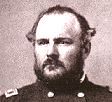 Major
John Milton Chivington (1821 - 1892)
Major
John Milton Chivington (1821 - 1892)On 29 November 1864 he led a regiment of Colorado Volunteers to the Cheyenne's Sand Creek reservation, where a band led by Black Kettle, a well-known "peace" chief, was encamped. Federal army officers had promised Black Kettle safety if he would return to the reservation, and he was in fact flying the American flag and a white flag of truce over his lodge, but Chivington ordered an attack on the unsuspecting village nonetheless. After hours of fighting, the Colorado volunteers had lost only 9 men in the process of murdering between 200 and 400 Cheyenne, most of them women and children. After the slaughter, they scalped and sexually mutilated many of the bodies, later exhibiting their trophies to cheering crowds in Denver. Later in life, Chivington worked as a deputy sheriff before dying from cancer in 1892.
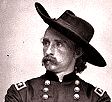 General
George Armstrong Custer (1839 - 1876)
General
George Armstrong Custer (1839 - 1876)Impulsive, always ambitious, frequently ruthless Lieutenant Colonel Custer (posthumously promoted to General) has enjoyed popular support in American history books for his exploits against the Indians. His rise to fame came at the Battle of Washita (27 November 1868), where he decimated the Cheyenne tribe of Chief Black Kettle. Over a hundred men, women and children were killed (including Black Kettle himself) and 800 Indian horses shot. He met his match in the Battle of Little Big Horn (25 June 1876) where his well-documented disdain for Indian fighting prowess caused him to attack a superior force of Sioux and Cheyenne warriors led by Crazy Horse. Every one of his 210 men was killed, and he himself was finally discovered two days later, stripped naked and shot in the left temple and chest.
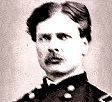 General
James William Forsyth (1835 - 1906)
General
James William Forsyth (1835 - 1906)On 29 December 1890 at Wounded Knee Creek, then-Colonel Forsyth and his troops surrounded an encampment of Sioux Indians under Chief Bigfoot, who was racked with pneumonia and dying. Forsyth ordered the disarmament of the Indians. The women and children were separated from the men. The soldiers were very abusive and spoke of revenge for Custer. The Indians were almost completely disarmed and completely surrounded by the soldiers, when they attempted to take the rifle of a deaf mute. It discharged and the soldiers started firing on the mostly unarmed Indians. About 300 of Big Foot's band were killed (90 men and over 200 women and children). About thirty soldiers also died, many in their own crossfire. Some women and children were found as far as two miles away, gunned down by soldiers. 20 Congressional Medals of Honor were awarded after this massacre. Forsyth was promoted to Major General in 1897, at which rank he retired from the military. He died in Columbus, Ohio.
 Lyman
Frank Baum (1856 - 1919)
Lyman
Frank Baum (1856 - 1919)Famous author of "The Wizard of Oz", written in 1900, he distinguished himself earlier in his career when, as a newspaper editor, he twice advocated the genocide of the Lakota Indians. After Sitting Bull's assasination he wrote in the Aberdeen Pioneer on 15 December 1890: "The Whites, by law of conquest, by justice of civilization, are masters of the American continent, and the best safety of the frontier settlements will be secured by the total annihilation of the few remaining Indians. Why not annihilation? Their glory has fled, their spirit broken, their manhood effaced; better that they die than live the miserable wretches that they are." Baum then wrote the following on 20 December after the Wounded Knee Massacre: "The PIONEER has before declared that our only safety depends upon the total extirmination [sic] of the Indians. Having wronged them for centuries we had better, in order to protect our civilization, follow it up by one more wrong and wipe these untamed and untamable creatures from the face of the earth."
 General
William Tecumseh Sherman (1820 - 1891)
General
William Tecumseh Sherman (1820 - 1891)Most renowned for his scorched-earth tactics in the Civil War, he was outspoken in his belief that Indian policy should be set by the army, and that the aim of Indian policy should be to place the various tribes on reservations and force them to stay there. He once declared that all Indians found outside reservations "are hostile and will remain so until killed off." He became general commander of the United States Army in 1869, where he directed a series of campaigns that finally crushed Indian resistance across the plains. He perceived clearly the devastating effectiveness of striking at the economic basis of the Plains Indians, commenting to General Philip Sheridan that "it would be wise to invite all the sportsmen of England and America... for a Grand Buffalo Hunt, and make one grand sweep of them all." He endorsed Sheridan's innovation of attacking Indian encampments during the winter, when their supplies and mobility were both severely limited. Sherman moved first against the Kiowas and Comanches of the southern Plains, then against the Lakota and Cheyenne of the north. By the late 1870s, these and the other once free-roaming warrior tribes of the plains had been forced onto reservations. He died in New York in 1891.
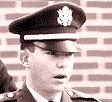 Lieutenant
William Calley Jr. (1943 - )
Lieutenant
William Calley Jr. (1943 - )On 16 March 1968, the men of Charlie Company under the command of Lieutenant Calley executed over 300 civilians during a "search and destroy" mission in My Lai and neighboring villages in central Vietnam. According to eyewitness reports offered after the event, several old men were bayoneted, praying women and children were shot in the back of the head, and at least one girl was raped, and then killed. For his part, Calley was said to have rounded up a group of the villagers, ordered them into a ditch, and mowed them down in a fury of machine gun fire. Calley, the only American tried in connection with the massacre, was sentenced by a court-martial to life imprisonment. In the end, he served only days in Fort Leavenworth, before being transferred back to Fort Benning, where he was placed under house arrest. His sentence was repeatedly reduced until he was finally pardoned by President Nixon. Calley is presently a jeweler in Georgia.
 Senator
J. Robert Kerry (1943 - )
Senator
J. Robert Kerry (1943 - )Kerry served in Vietnam from 1966-69. His most famous action was when he led a squad of US Navy SEALS in the Mekong Delta village of Thanh Phong, where on the night of 25 February 1969 his unit butchered 21 women, children and elderly men. He received the Silver Star, Bronze Star, and Congressional Medal of Honor. He later served as the Governor of Nebraska from 1982 to 1987 and ran for the presidency in 1992, when Bill Clinton received the nomination. He has since left public office and now serves as President of The New School for Social Research in New York.
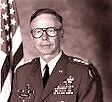 General
Maxwell Reid Thurman (1931 - 1995)
General
Maxwell Reid Thurman (1931 - 1995)Nicknamed "Mad Max", he commanded the 1989 invasion of Panama. The action itself, which was played up by the media as a smashing success, had thousands of Panamanian civilians killed, many of them murdered by American troops and shoveled into mass graves. These claims are supported by several independent humanitarian groups and the eyewitness testimony of countless Panamanian citizens, who claim that not only were atrocities committed by American soldiers operating outside their legal jurisdiction, but also, according to medical reports, many sustained wounds that could not have been made by conventional weapons, suggesting that chemical weapons were used in the invasion. Thurman was an active opponent of homosexuals in the Armed Forces. He died of leukemia.
President | War Ads | War Gossip | War Movies | Heroes
Indian Problem | Quotes | Forum | Guest Book | Home
This site is best viewed at 1024
X 768
Please report any dead links or problems to the WebMaster.
Copyright © Federal Bureau December 2003